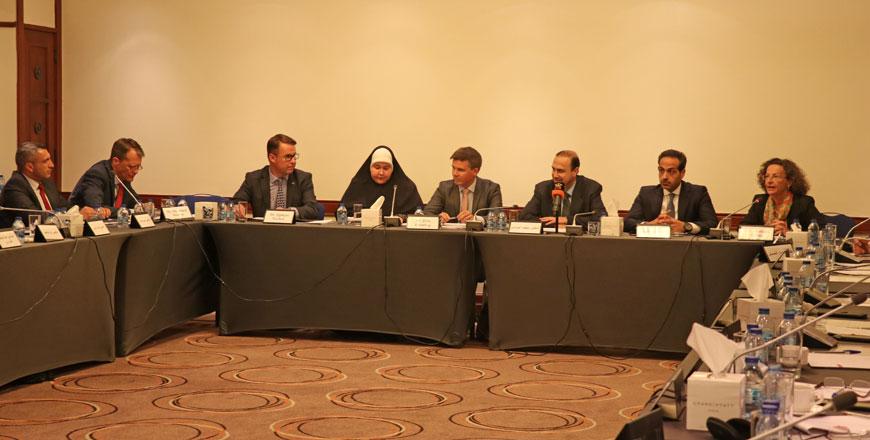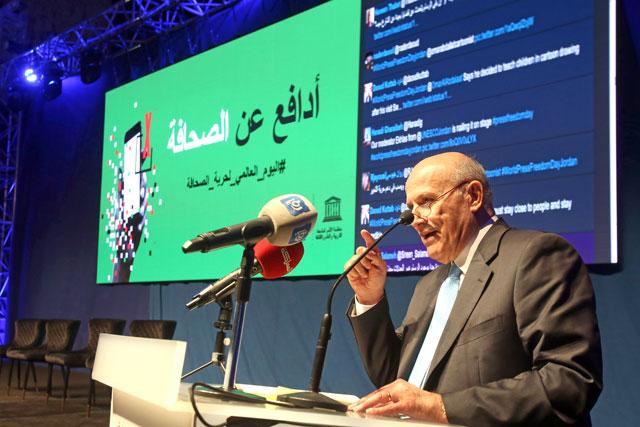You are here
UNESCO celebrates World Press Freedom Day 2018
By Camille Dupire - May 12,2018 - Last updated at May 12,2018

Participants in a roundtable discussion organised by UNESCO Amman office on Thursday on the occasions of the the annual World Press Freedom Day (Photo Camille Dupire)
AMMAN — The UNESCO Amman office on Thursday celebrated the annual World Press Freedom Day (WPFD) with a roundtable discussion on this year’s WPFD global theme of “Keeping Power in Check: Media, Justice and the Rule of Law”.
The event, which gathered representatives of the judiciary, legal professionals and government officials, aimed to provide a platform for various stakeholders to “discuss the interplay between media, the judiciary and the rule of law, within the context of the 2030 Agenda for Sustainable Development”, a UNESCO official told The Jordan Times.
UNESCO Representative to Jordan Costanza Farina opened the sessions, saying: “World Press Freedom Day serves to emphasise the importance of free and independent journalism for advancing the 2030 Agenda that Jordan, like all other countries of the world, endorsed in September 2015.”
Marked annually on May 3, WFPD aims to “celebrate the fundamental principles of press freedom, evaluate press freedom, defend the media from attacks on their independence and pay tribute to journalists who have lost their lives in the exercise of their profession”, according to the UNESCO website, which highlighted this year’s importance as the 25th anniversary of the celebration.
Speaking at the event, Judge Ghazi Huweimel chief of Amman Court of First Instance, outlined the strategy of the Judicial Institute of Jordan which trains judges and diploma students, stressing the importance of cooperation with national and international institutions to expand the training programmes on freedom of expression.
During a session titled “Judicial Trends in Addressing Media Cases in 2017 and 2018”, Judge Amal Abu Ubaid of the Amman Court of First Instance discussed how the press and publication chamber, a specialised court room, has contributed in improving legal practices to support freedom of the press in the Kingdom.
Minister of State for Media Affairs Mohammad Momani noted: “Jordan has advanced in press freedom as a result of the strict application of the laws and media legislation,” highlighting the independence of the judiciary as “one of the critical foundations of the Jordanian state and its role in defending freedom and the values of society”.
“It is especially importantto have specialised judges in press and publication, and to define a standardised media legislation,” said journalist and former MP Kholoud Khatatbah, as she highlighted the role of the media in supporting the independence of the judiciary.
Khalid Khlaifat, media lawyer, then presented a draft impact assessment on challenges and opportunities of the Swedish International Development Cooperation Agency-funded capacity development activities implemented by UNESCO for the Jordanian judiciary.
Erik Ullenhag, Ambassador of Sweden to Jordan, joined the roundtable, noting that “freedom of expression and freedom of the press have strengthened the judicial system, making it more effective”.
The event concluded with recommendations including the importance of media coverage of public trials to bring public opinion cases into the spotlight and showcase the greater role of the judiciary in protecting the freedom of expression. It also called for the establishment of an advisory committee of judges and lawyers to analyse the best practices of the legal decisions, and present the recommendations to support the drafting of the laws and amendments.
Participants stressed the importance of organising exchanges to share experiences on the definition of privacy and support specialised media training for judges on media freedom and professional ethics.
The celebration was co-sponsored by the EU-funded “Support to Media in Jordan” project, represented by EU official Egidijus Navikas, who stressed the union’s “firm belief in the power of the judiciary system in supporting freedom of expression”.
Related Articles
AMMAN — The Jordan Press Foundation (JPF) — Al Rai on Wednesday hosted the UNESCO celebration of the World Press Freedom Day (WPFD) 2019, on
AMMAN — The Jordan Press Foundation (JPF) — Al Rai on May 15 will host the official celebration for UNESCO’s World Press Freedom Day 2019.Th
AMMAN — Judicial officers, journalists, civil society activists, parliamentarians, lawyers and access to information regulatory bodies joine

















